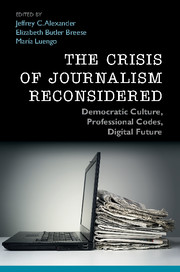Book contents
- Frontmatter
- Dedication
- Contents
- About the Contributors
- Preface
- Acknowledgments
- Introduction: Journalism, democratic culture, and creative reconstruction
- PART I THE CRISIS NARRATIVE
- PART II FEARS OF DIGITAL NEWS MEDIA: THE SYMBOLIC STRUGGLE
- 6 When codes collide: Journalists push back against digital desecration
- 7 Telling the crisis story of journalism: Narratives of normative reassurance in Page One
- 8 Assembling publics, assembling routines, assembling values: Journalistic self-conception and the crisis in journalism
- 9 The constancy of immediacy: From printing press to digital age
- 10 News on new platforms: Norwegian journalists face the digital age
- PART III PROFESSIONAL JOURNALISM, CIVIL CODES, AND DIGITAL CULTURE
- Conclusion: News innovations and enduring commitments
- Index
- References
8 - Assembling publics, assembling routines, assembling values: Journalistic self-conception and the crisis in journalism
from PART II - FEARS OF DIGITAL NEWS MEDIA: THE SYMBOLIC STRUGGLE
Published online by Cambridge University Press: 05 June 2016
- Frontmatter
- Dedication
- Contents
- About the Contributors
- Preface
- Acknowledgments
- Introduction: Journalism, democratic culture, and creative reconstruction
- PART I THE CRISIS NARRATIVE
- PART II FEARS OF DIGITAL NEWS MEDIA: THE SYMBOLIC STRUGGLE
- 6 When codes collide: Journalists push back against digital desecration
- 7 Telling the crisis story of journalism: Narratives of normative reassurance in Page One
- 8 Assembling publics, assembling routines, assembling values: Journalistic self-conception and the crisis in journalism
- 9 The constancy of immediacy: From printing press to digital age
- 10 News on new platforms: Norwegian journalists face the digital age
- PART III PROFESSIONAL JOURNALISM, CIVIL CODES, AND DIGITAL CULTURE
- Conclusion: News innovations and enduring commitments
- Index
- References
Summary
INTRODUCTION: EXPLANATIONS FOR A “CRISIS”
There can be little doubt that something traumatic has happened in American newsrooms over the past ten years. To recite the usual statistics: Newspaper print advertising revenue has plummeted by more than half since 2003. Total newsroom employment is down 30 percent since 2000 and has dropped to a level of staffing not seen since 1978 (Pew Research 2014). A few large newspapers have closed, while many others, including many of the newspapers owned by Advance Publications, have cut back printing and home delivery days. In the eyes of the public at large, journalists’ and the news they produce are trusted less than ever (Ipsos MORI 2013). The work routines and production flows at hierarchically oriented, bureaucratic news institutions have veered toward the chaotic; production processes are now far different than they were only a few years ago, and what is worse, they show no signs of stabilizing anytime soon. Technological change, finally and obviously, plays a role in all these developments – from wrecking advertising cross-subsidy to disrupting newsroom routines. In short: The last ten years have witnessed a well-documented economic, political, and organizational crisis of American news production.
Has the past decade also seen the emergence of yet an additional crisis: a cultural crisis within journalism as a professional occupation? In discussing the possibility of the existence of an occupational cultural crisis I am referring to something quite specific. By occupational culture I mean the symbols and metaphors that guide journalists’ understandings of what they do and why they do it, as well as the various intra-group conversations through which journalists make sense of those symbolic orientations. By crisis I mean, simply, that journalists’ metaphorical guideposts and actual work practices are diverging in meaningful and potentially traumatic ways; that the what and the why of journalistic work have become, to twist that favorite catchphrase of future of news gurus everywhere, unbundled. Claiming that there is a cultural crisis in American newsrooms implies, further, that these symbolic disorientations are related to, but not ultimately reducible to, the economic, technological, political, and organizational changes listed above.
In this chapter I want to obliquely make a case for a deeper understanding of this occupational cultural crisis by highlighting two specific moments when journalistic self-understanding was temporarily challenged, before it snapped back into settled routines and symbolic orientations.
- Type
- Chapter
- Information
- The Crisis of Journalism ReconsideredDemocratic Culture, Professional Codes, Digital Future, pp. 153 - 169Publisher: Cambridge University PressPrint publication year: 2016
References
- 3
- Cited by



